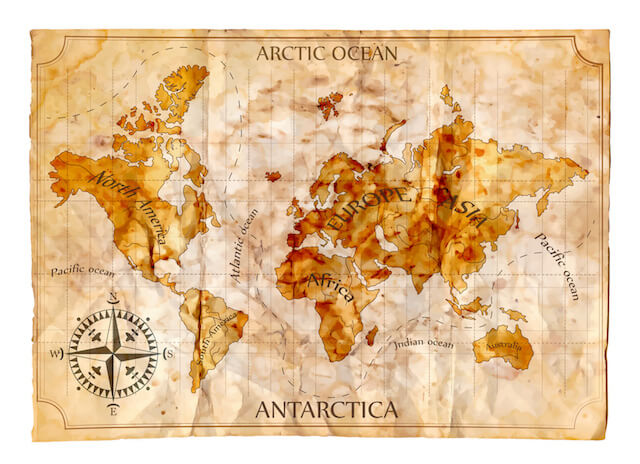Here there be dragons.

Pirates, Dragons and going off the map
This week I was on a great and highly interactive zoom event hosted by the Reinventing Work network. The guest speaker was my friend Alex Barker of Be More Pirate, who highlighted some of the core ways in which Pirates were successful.
One of the core elements is that leadership was shared between the Captain and the Quartermaster, the latter providing the focus on the culture. However little we may know about how Pirates operated, we have likely heard of the idea of a Pirates Code, in other words, a set of values used t build trust.
In her session, and given where we are in the world, Alex also encouraged us to “be more pirate”, to look to the edges of the map (or even off the map, I would say!) for ways to lead, to operate, to work in future.
She noted that at the edge of pirate maps, often, pointing off the known map, there was a drawing and the words “here there be dragons”.
How were Pirate Captains and Quartermasters able to take their crews to the edges and off the map? Trust.
As Alex spoke, I was reminded of a post I wrote around a decade ago called “Face the Dragons“. In the years since the core thoughts in that post have developed into my mantra for the way to lead in our emerging world, that of OpenLeadership, the core thoughts of which you can find on my home page, the BeMoreYou page and that OpenLeadership page, and are at the heart of the nearly 1,000 (so far) daily posts on this site.
Oh, and in that post, I even refer to health systems and what it takes to lead such complex (not complicated, complex) systems. Having had to go to a major hospital several times in the heart of the pandemic, what was one of the core elements I observed allowing that system to function well? Yes, correct, it was trust.
So, reposting it in full here for you.
Face the Dragons
This article was first posted back in 2010, then thought of again in 2019, now shared once more today in our current context, where we need our governments and organisations and businesses to trust their people rather than command and control them.
We live in a world far different from just a few years ago, a world where what it takes to be a successful leader has totally and completely changed. We live in a world where a leader must face the dragons of the unknown.
Our brave new world is one where leaders can no longer hope to know all the answers, so the old measures and methods of leadership are no longer fit for purpose. Instead, they must learn and apply new skills to lead their organisations to be flexible, able to measure and accept the risk, and be prepared and ready to face as yet unknown challenges.
On ancient maps, dragons were drawn to symbolize the unknown, and to travel beyond the familiar world was to “go where there be dragons.” This analogy of the unknown is true for leaders from the smallest company to the largest organisations and highest offices.
Our world is no longer simply complicated, it is complex. What is the difference? Brenda Zimmerman of Schulich School of Business explains: “Performing hip replacement surgery is complicated. It takes well-trained personnel, precision and carefully calibrated equipment. Running a health care system, on the other hand, is complex. It’s filled with thousands of parts and players, all of whom must act within a fluid, unpredictable environment. To run a system that is complex, it’s not enough to get the right people and the ideal equipment. It takes a set of simple principles that guide and shape the system.”
What, then, is the role of a leader where the world is too complex to manage by the book and where diversity, ambiguity, speed and expectations are ever-changing? It is, as Ms. Zimmerman put it, to “guide and shape”, to keep the organisation true to its purpose and values.
As Chip Conley teaches with “Peak”, the most powerful organisations are those where people don’t work for the carrot (the money) or the stick (just keeping a job), but because they are empowered to reach for a deeper purpose, both their own and their organizations. These motivated people are loyal, hard-working, creative, and will help their organisation thrive in a complex world. What, then, is the key to leading an empowered organisation in a complex world?
Trust
Great leaders trust their people, their values, their organisation. Trust is a two-way street though, and leaders cannot expect to be followed unless they also continually build trust through their actions and how they communicate.
Seth Godin observes in one of his most powerful posts: “the organisations that matter are busy being run by people who figure out what to do next”. “Command and Control” is dead. Trust and Empowerment are what is “next” if you are to thrive in a complex world.
Some leaders will be able to adapt, and some of the leaders of today are showing greatness by recognising they won’t be the leaders of tomorrow and are finding their successors. For those remaining leaders who can evolve, and for those new leaders who will emerge, this post is music to their ears. They are ready to Reinvent or Die, mess with normal, embrace the risk of the new, and Go Where There Be Dragons!
How are you adapting to the new normal? What is or was your organisational dragon?
